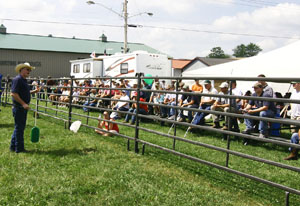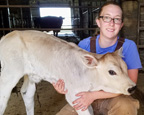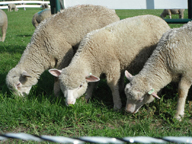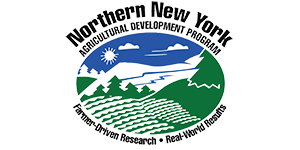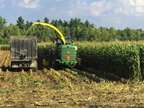
March 31, 2019. The results of the 2019 Northern New York Agricultural Development Program (NNYADP)-funded corn hybrid evaluation include the potential of the 74 hybrids in the trial to support milk production. The 2019 season results, and reports from earlier years’ trials in Northern New York, are now posted at https://nnyagdev.org/wp-content/uploads/2020/03/NNYADPCornHybridsFINAL_1.pdf.
Today at 1 pm, Cornell University PRO-DAIRY Forage Systems Specialist Joseph Lawrence will talk about the NNY regional corn hybrid evaluation results as part of the 2020 Corn Silage Strategies Webinar. To register for the webinar, see https://prodairy.cals.cornell.edu/webinars/. The webinar will be posted online after March 31 at https://prodairy.cals.cornell.edu/webinars/webinar-recordings/#Forage%20Management.
Lawrence worked with Cornell University Plant Breeding and Genetics researcher Margaret Smith, Ph.D., and Cornell PRO-DAIRY program director Thomas Overton, Ph.D., to evaluate the 74 corn hybrids for silage and grain harvest at two farm sites in northern New York in 2019.
Forty-nine 96-110 day relative maturity hybrids were planted in Madrid in St. Lawrence County; twenty-five 80-95 day relative maturity hybrids were planted in Willsboro in Essex County.
The NNYADP 2019 corn hybrid evaluation report includes data in 22 categories including hybrid yield; protein content, and predicted dry matter intake.
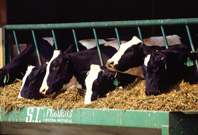
Since 2016, the evaluations have included an assessment of fiber digestibility as an indicator of forage quality of the corn silage and a calculation of the predicted milk production output potential of the hybrids in the trial.
“This research provides information to help farmers enhance their opportunity for high quality corn production and its positive impact on milk production,” says Lawrence.
The researchers always remind growers to select hybrids based on multi-year, multi-location data. Lawrence notes, “Any hybrid can have a ‘banner’ year or grow in ‘ideal’ environmental conditions in one location or one year but not necessarily hold up in other growing seasons. Multi-location and multi-year data gives you a better assessment of a hybrid’s potential under variable conditions.”
The results of the NNYADP-funded trials of corn hybrids are incorporated into the multi-year tables of the Cornell Guides for Integrated Field Crop Management; the 2019 data will be added to the 2021 edition of the guide.
Corn is the primary row crop for northern New York and a staple of dairy feed rations in the region. About 65 percent of the northern NY corn crop is harvested as silage and 35 percent as grain. Some of the regional corn harvest is sold as a cash crop in support of the ethanol industry. The northern NY corn crop accounts for approximately 20 percent of the silage acres statewide.
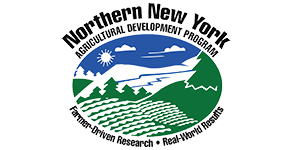
Funding for the Northern New York Agricultural Development Program is supported by the New York State Legislature and administered by the New York State Department of Agriculture and Markets. Learn more at www.nnyagdev.org.
